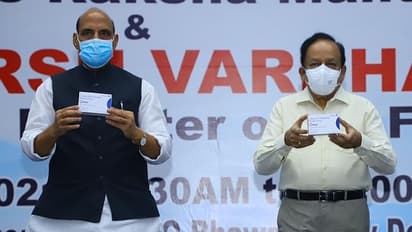First batch of DRDO's anti-Covid drug 2-DG is now available

Synopsis
A total of 10,000 sachets of the drug will be supplied in several hospitals in Delhi.
Defence Minister Rajnath Singh and Health Minister Harsh Vardhan on Monday released the first batch of DRDO-developed anti-Covid drug 2-deoxy-D-glucose (2-DG) in the national capital.
Rajnath Singh said, "I thank all those who have been associated in the research and development of this drug, including the DRDO. 2-deoxy-D-glucose (2-DG) drug would be helpful in containing the virus. This is an example of our country's scientific prowess."
A total of 10,000 sachets of the drug will be supplied in several hospitals in Delhi.
"I have been informed that comparatively, people who have been treated with this drug got well two and half days faster than those on normal care. We have got to see that dependency on oxygen is reduced by 40 per cent. The best thing is it is in powder form, which the people can easily mix with water and use like ORS," he said in the presence of DRDO Chairman G Sateesh Reddy and AIIMS Director Randeep Guleria.
How does 2-DG work?
The anti-Covid therapeutic application has been developed by the Institute of Nuclear Medicine and Allied Sciences -- a DRDO laboratory -- in collaboration with Hyderabad-based Dr Reddy's Laboratories.
Clinical trial results have shown that the drug enables faster recovery of hospitalised Covid-19 patients and reduces their supplemental oxygen dependence.
Covid patients treated with 2-DG showed a higher proportion of RT-PCR negative conversion.
What did the clinical trials show?
During the first wave of the Covid-19 pandemic in 2020, INMAS-DRDO scientists conducted laboratory experiments with the help of the Centre for Cellular and Molecular Biology in Hyderabad and found that this molecule works effectively against the SARS-CoV-2 virus and inhibits viral growth.
Based on these results, the DCGI's Central Drugs Standard Control Organisation permitted Phase-II clinical trials of 2-DG in Covid-19 patients in May 2020.
The DRDO conducted Phase-II trials till October, it was found to be safe for treating Covid-19 patients.
All over the country, phase II-A was conducted in six hospitals and Phase II-B clinical trial was conducted at 11 hospitals, in which a total of 110 patients participated.
On May 8, the Drugs Controller General of India gave approval for emergency use in moderate to severe case of the virus.